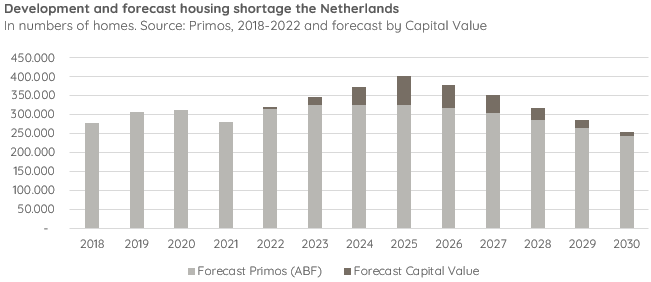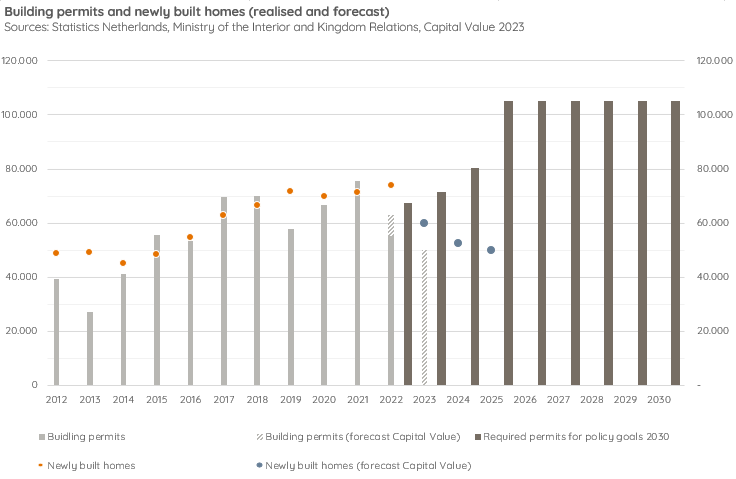Dutch housing shortage increases to 400,000 homes
13 februari 2023
The housing shortage will grow to more than 325,000 homes in 2023, which amounts to 4% of the housing stock and is an increase compared to 2022 (279,000). This is revealed by the annual Primos forecast conducted by ABF Research. Due the potential postponement of the construction of approximately 40,000 homes in 2023-2024 and a reduction in the amount of issued permits, Capital Value expects the shortage to increase even further to 400,000 in 2025. Incentive measures are needed to prevent a housing construction collapse. The developments are especially detrimental to the already precarious position of first-time tenants and senior citizens. But the good news is that there are more construction plans and that institutional investors and housing associations still have enough capital to realise 30,000 affordable rental homes per year. Nevertheless, if no incentive measures are taken, it will not be possible to realise all of these homes, as more and more projects are proving financially unfeasible. This is evident from Capital Value's annual research performed in collaboration with ABF Research, Housing and residential investment market in the Netherlands.
Number of households increased by 150,000 in 2022
The growth in the number of households is an important indicator of the demand for new homes. In early 2022, the Netherlands counted 8,138,000 households. With the influx of Ukrainian refugees, this number rose by 150,000 in 2022; a significant increase, as the average growth is 63,200 per year. Between now and 2032, the number of citizens aged 75 and over will increase by 31% (from 1,161,000 to 1,519,000 households in 2032).
Shortages greatest in major cities
The growth of the population and the number of households will see the housing shortage increase to 325,000 homes this year. The greatest shortages are found in the major cities, including the regions of Greater Amsterdam (6.5%, approximately 45,000 homes), Delft and Westland (7.2%, approximately 7,650 homes) and Greater The Hague (5.6%, approximately 23,540 homes). Rotterdam and Utrecht will also suffer a further deficit increase up to 30,540 and 30,000 homes, respectively. Due to potential delays in the construction of approximately 40,000 homes in 2023-2024 and a reduction in the amount of issued permits, Capital Value expects the shortage to increase even further.

Potential delay in construction of 40,000 homes in 2023-2024
The national government has set the objective of reducing the housing shortage to 2% in or before 2035 and to build 100,000 new homes per year. A record number of homes were completed in 2022, but the number of building permits fell by 18% in the same year. The number of building permits issued in 2022 will likely total 62,000, whereas in 2021 this figure was 75,800. Capital Value expects that if no incentive measures are taken, the number of permits issued in 2023 and 2024 will drop further to 50,000. Property developers are increasingly postponing their construction plans due to the shrinking demand for owner-occupied homes, while more and more new-build plans for rental homes are proving financially unfeasible. Research by Capital Value shows that the construction of as many as 40,000 homes may be postponed, of which approximately 27,200 in the five biggest Dutch cities. A large proportion of these concern projects for which building permits have already been awarded or for which the permit procedure is underway. 
Situation of students and senior citizens even more precarious
The growing number of students and the limited new supply of student housing are expected to further increase the student housing shortage to 44,800 in the 2029-2030 academic year. A worrying development is that the number of foreign pension funds in this segment is rapidly falling, as the capital of these parties played in important role in the construction of new projects in recent years (74% in 2021, 31% in 2022). Furthermore, an additional 480,000 homes suitable for senior citizens are needed by 2040 to accommodate the explosive growth of this population segment. Construction for the elderly demographic has fallen short of the required levels in recent years, hampering a natural occupancy turnover. At the same time, the population of single citizens aged 75 and older is set to increase by 218,000 in the coming nine years. This increase is particularly sharp in the regions of Flevoland (+105%), Greater Amsterdam (+63%) and Southwest Overijssel (+63%).
Sufficient capital for construction of 30,000 affordable rental homes per year
Investors interviewed by Capital Value indicate that their joint available capital amounts to more than €25 million for the coming three years, a significant part of which can be invested in the construction of new rental homes. Housing associations have taken on a significantly more active role in investments in new rental home construction. Between associations and institutional investors, the available resources are enough to enable the construction of 30,000 affordable homes per year. However, the question is to what extent this capital can be used for new build. In 2022, Dutch pension funds invested only 33% of their available capital in new build. Without incentive measures, the aforementioned potential figure of 30,000 rental homes will not be realised.
Hurdles in new build
Investors who participated in Capital Value's annual research primarily point to the increased construction costs as a major hurdle to intentions to realise new build, as well as the increased interest rate. Construction costs rose by approximately 9% in 2022 compared to 2021 (Statistics Netherlands). Many investors also mention the combination of local and national regulations, the high price of land and declining sale prices. Developers say they are especially hindered by the increased construction costs (53%) and slow issuance of permits (53%), while housing associations mention the lack of available building plots (71%) and inadequate cooperation by municipalities (48%) as causes of faltering new-build projects.
Urgent need for incentive measures to prevent contraction of the housing market
Marijn Snijders, managing director at Capital Value: "All market parties are willing to invest more in new build. In practice, however, investors are no longer able to make the numbers add up for construction projects. Incentive measures are therefore desperately needed to keep new-build business going. Previously, we already called for a VAT reduction on construction materials or the reintroduction of the so-called Van der Laan subsidy scheme. We must do everything we can to prevent a collapse in housing construction and the contraction of the rental housing market that would follow, especially since there are approved plans that could be built right away and there is still sufficient capital to invest in affordable rental homes."
More information?
The full research report is available in Dutch via research.capitalvalue.nl. The report will be available in English early March.


